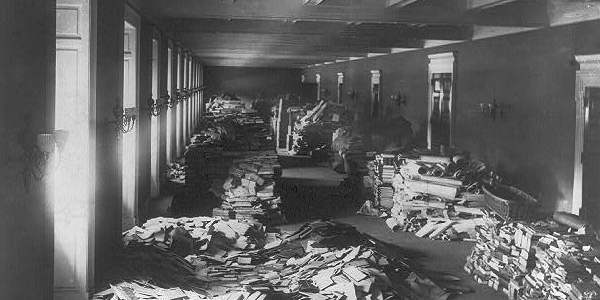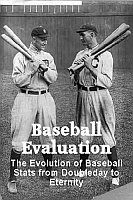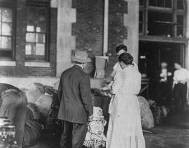Sponsor this page. Your banner or text ad can fill the space above.
Click here to Sponsor the page and how to reserve your ad.
-
Timeline
Detail - 1891
March 3, 1891 - The 51st Congress of the United States passes the International Copyright Act of 1891.

So how did the act come about? The initial copyright act of 1790 only protected citizens of the United States for their works over fourteen years, and had no protection for citizens of foreign nations. If a United States citizen wanted to have protection in France, he had to acquire residency, whatever that meant, in France. Often, foreign authors would collaborate with an American author in order to gain copyright protection in one nation or the other. It was a copyright mess. British and American authors, then officials began to discuss a new copyright arrangement from 1830 forward, with additional pressure mounting in 1853-4 during the administrations of Millard Filmore and Franklin Pierce. It stalled.
Decades passed with increased pressure pushed for international copyright legislation. Authors such as Mark Twain and Louisa May Alcott, the American Copyright League, established in 1883, and finally Congress, got into the act in 1885 with Senator Joseph Roswell Hawley introducing legislation. That stalled as well, despite President Grover Cleveland's statement on the issue during his first State of the Union address.
By 1891, the pressure to do something on the issue of foreign copyright protection in the United States had reached the need for action. In 1886, some foreign nations had entered into treaty arrangements on the issue, but the United States did not take part. Finally, a bill was introduced in the Senate, sponsored by Jonathan Chace of Rhode Island during the 1889 session. He was a banker by trade, President of the Phoenix National Bank of Providence, and had been a noted abolitionist involved in the Underground Railroad during the Civil War when he operated a dry goods store in Philadelphia.
And why did it pass in 1891 when it had not in previous attempts? There was a condition protecting American printers in the Manufacting Clause. It stated that foreign works had to be printed from typeset in the United States to gain protection under U.S. Copyright. Did Jonathan Chase vote for the final bill? No, he did not run for reelection and was not present during the 1891 session. Despite this, the act is often known as the Chace act. It would begin on July 1, 1891.

Full Text, U.S. Copyright Act of 1891
CHAP. 565.-An act to amend title si y, chapter three, of the Revised Statutes of the United States, relating to copyrights .
Be it enacted by the Senate and House of Representatives of the
copyrights. United States of America in Congress assembled, That section fortynine hundred and fifty-two of the Revised Statutes be, and the same is hereby, amended so as to read as follows :
SEC.- 4952. The author, inventor, designer or proprietor of any
book, map, chart, dramatic or musical composition, engraving, cut, or photograph or negative thereof, or of a painting, drawing, chromo, statue, statuary, and of models or designs intended to be perfected as works of the fine arts, and the executors, administrators, or assigns of any such person shall, upon complying with the provisions of this chapter, have the sole liberty of printing, reprinting, publishing, completing, copying, executing, finishing, and vending the same; and, in the case of dramatic composition, of publicly performing or representing it or causing it to be performed or represented by others; and authors or their assigns shall have exclusive right to dramatize and translate any of their works for which copyright shall have been obtained under the laws of the United States."
SEC. 2. That section forty-nine hundred and fifty-four of the Revised Statutes be, and the same is hereby, amended so as to read as follows:
"SEC. 4954. The author, inventor, or designer,, if he be still living, or his widow or children, if he be dead, shall have the same exclusive sive right continued for the further term of fourteen years, upon recording the title of the work or description of the article so secured a second time, and complying with all other regulations in-regard to original copyrights, within six months before the expiration of the
first term; and such persons shall, within two months from the date of said renewal, cause a copy of the record thereof to be published or in one or more newspapers printed in the United States for the space of four weeks."
SEC. 3. That section forty-nine hundred and fifty -six of the Revised Statutes of the United States be, and the same is hereby, amended so that it shall read as follows:
"SEC. 4956. No person shall be entitled to a copyright unless he shall, on or before the day of publication in this or any foreign country, deliver at the office of the Librarian of Congress, or deposit in the mail within the United States, addressed -to the Librarian of amended. Congress, at Washington, District of Columbia, a printed copy of
the title of the book, map, chart, dramatic or musical composition, engraving, cut, print, photograph, or 'chromo, . or a description of the painting, drawing, statue, statuary, or a model or design for a work of the fine arts for .which he desires a copyright, nor unless he shall also, not later than the day of the publication thereof in this or any foreign country, deliver at the office of the Librarian of Congress, at Washington, District of Columbia, or deposit in the mail
within the United States, addressed to the Librarian of Congress, at Washington, District of Columbia, two copies of such copyright book, map, chart, dramatic or musical composition, engraving, chromo, cut, print, or photograph, or in case of a painting, drawing, statue, statuary, model, or design for a work of the fine arts, a photograph of same: Provided, That in the case of a book, photograph, chromo,or lithograph, the,two copies of the same required to be delivered or deposited as above shall be printed from type set within the limits of the United States, or from plates made therefrom, or from negatives, or drawings on stone made within the limits of the United States, or from transfers made therefrom. During the existence of such copyright the importation into the United States of any book, chromo, lithograph, or photograph, so copyrighted, or any edition or editions thereof, or any plates of the same not made from type set, negatives, or drawings on stone made within the limits of the United States, shall be, and it is hereby prohibited except in the. cases specified in paragraphs five hundred and twelve to five hundred and sixteen, inclusive, in section two of the act entitled "An act to reduce the revenue and equalize the duties on imports, and for other purposes," approved October first, eighteen hundred and ninety; and except in the case of persons purchasing for use and not for sale, who import subject to the duty thereon, not more than two copies of such book at any one time; and except in the case of newspapers and magazines, not containing in whole or in part matter copyrighted under the provisions of this act, unauthorized by the author, which are hereby exempted from prohibition
of importation: Provided, nevertheless, That in the case of books in foreign languages, of which only translations in English are copyrighted the prohibition of importation shall apply only to the translation of the same, and the importation of the books an the original language shall be permitted."
SEC. 4. That section forty-nine hundred and fifty-eight of the Revised Statutes be, and the same is hereby, amended so that it will read as follows:
"SEC. 4955. The Librarian of Congress shall receive from the persons to whom the services designated are rendered the following fees:
"First. For recording the title or description of any copyright
book or other article, fifty cents.
"Second. For every copy under seal of such record actually given
to the person claiming the copyright, or his assigns, fifty cents.
"Third. For recording and certifying any instrument of writing
for the assignment of a copyright, one dollar.
Fourth. For every copy of an assignment, one dollar.
"All fees so received shall be paid into the Treasury of the United States: Provided, That the charge for recording the title or description of any article entered for copyright, the production of a person not a citizen or resident of the United States, shall be one dollar, to be paid as above into the Treasury of the United States, to defray the expenses of lists of copyrighted articles as hereinafter provided for.
"And it is hereby made the duty of the Librarian of Congress to
furnish to the Secretary of the Treasury copies of the entries of titles of all books and other articles wherein the copyright has been completed by the deposit of two copies of such book printed from type set within the limits of the United States, in accordance with the provisions of this act and by the deposit ' of two copies of such other article made or produced in the United States; and the Secretary of the Treasury is hereby directed to prepare and print, at intervals of not more than a week, catalogues of such title-entries for distribution to the collectors of customs of the United States and to officials the postmasters of all post-offices receiving foreign mails, and such weekly lists, as they are issued, shall be furnished to all parties desiring them, at a sum not exceeding five dollars per annum; and the Secretary and the Postmaster-General are hereby empowered and required to make and enforce such rules and regulations as shall prevent the importation into the United States, except upon the conditions above, of all articles prohibited by this act."
SEC. 5 . That section forty-nine hundred and fifty-nine of the Revised Statutes be, and the same is hereby, amended so as to read as follows:
"SEC. 4959. The proprietor of every copyright book or other article shall deliver at the office of the Librarian of Congress, or deposit in the ,mail, addressed to the Librarian of Congress, at Washington, District of Columbia, a copy of every subsequent edition wherein any substantial changes shall be made: Provided, however, That the alterations, revisions, and additions made to books by foreign authors, authors heretofore published, of which new additions shall appear subsequently to the taking effect of this act, shall be held and deemed
capable of being copyrighted as above provided for in this act, unless they form a part of the series in course of publication at the time this act shall take effect."
SEC. 6 . That section forty-nine hundred and sixty-three of the
Revised Statutes be, and the same is hereby, amended so as to read as follows:
"SEC. 4963. Every person who shall insert or impress such notice, or words of the same purport, in or upon any book, map, chart, dramatic, or musical composition, print, cut engraving, or photograph, or other article, for which he has not obtained a copyright, shall be liable to a penalty of one hundred dollars, recoverable one-half for the person who shall sue for such penalty and one-half to the use of the United States."
SEC. 7 . That section forty-nine hundred and sixty-four of the Revised Statutes be, and the same is hereby, amended so as to read as follows:
"SEC. 4964. Every person, who after the recording of the title of any book and the depositing of two copies of such book, as provided by this act, shall, contrary to the provisions of this act, within the term limited, and without the consent of the proprietor of the copyright first obtained in writing, signed in presence of two or more witnesses, print, publish, dramatize, translate, or import, or knowing the same to be. so printed, published, dramatized, translated, or imported, shall sell or expose to sale any copy of such book, shall forfeit every copy thereof to such proprietor, and shall also forfeit and pay such damages as may be recovered in a civil action by such proprietor in any court of competent jurisdiction"
SEC. 8. That section forty-nine hundred and sixty-five of the Revised Statutes be, and the same is hereby, so amend as to read as follows:
"SEC. 4965 . If any person, after the recording of the title of any map, chart, dramatic or musical composition, print, cut, engraving, or photograph, or chromo, or of the description of any painting, drawing, statue, statuary, or model or design intended to be perfected and executed as a work of the fine arts, as provided by this act, shall within the term limited, contrary to the provisions of this act, and without the consent of the proprietor of the copyright first obtained in writing, signed in presence of two or more witnesses, engrave, etch,
work, copy, print, publish, dramatize, translate, or import, either in whole or injuart, or by varying the main design with intent to evade the law, or, knowing the same to be so printed, published, dramatized, translated, or imported, shall sell or expose to sale any copy of such map or other article as aforesaid, he shall forfeit to the proprietor all the plates on which the same shall be copied and every sheet thereof, either copied or printed, and shall further forfeit one dollar for every sheet of the same found in his possession, either printing, printed, copied, published, imported, or exposed for sale, and in case of a painting, statue, or statuary, he shall forfeit ten dollars for every copy of the same in his possession, or by him sold or exposed for sale; one-half thereof to the proprietor and the other half to the use of the United States."
SEC. 9 . That section forty-nine hundred and sixty-seven of the
Revised Statutes be, and the same is hereby, amended so as to read as follows:
"SEC. 4967 . Every person who shall print or publish any manuscript whatever without the consent of the author or proprietor first obtained, shall be liable to the author or proprietor for all damages occasioned by such injury."
SEC. 10. That section forty-nine hundred and seventy-one of the
Revised Statutes be, and the same is hereby, repealed.
SEC. 11 . That for the purpose of this act each volume of a book in two or more volumes, when such volumes are published separately and the first one shall not have been issued before this act shall take effect, and each number of a periodical shall be considered an independent publication, subject to the form of copyrighting as above.
SEC. 12. That this act shall go into effect on the first day of July, anno Domini eighteen hundred and ninety-one.
SEC. 13. That this act shall only apply io a citizen or subject of a foreign state or nation when such foreign state or nation permits to citizens of the United States of America the benefit of copyright on substantially the same basis as its own citizens; or when such foreign state or nation is a party to an international agreement which provides for reciprocity in the granting of copyright, by the terms of which agreement the United States of America may, at its pleasure, become a party to such agreement. The existence of either of the conditions aforesaid shall be determined by the President of the
United States by proclamation made from time to time as the purposes of this act may require.
Approved, March 3, 1891.
Photo above: Montage of Mark Twain (left), Jonathan Chace (center), and Louisa May Alcott (right). Twain, 1902, Charles A. Bolles. Chace, 1876/1889, Brady. Alcott, 1870/1884, George Kendall Warren. Courtesy Library of Congress. Below: Piles of Copyright Material in the Jefferson Building basement, circa 1898. Courtesy Library of Congress. Info Source: Library of Congress, Statutes 51st Congress; Wikipedia Commons; legisworks; uslaw.link; copyrighthistory.org; govtrack.us.







